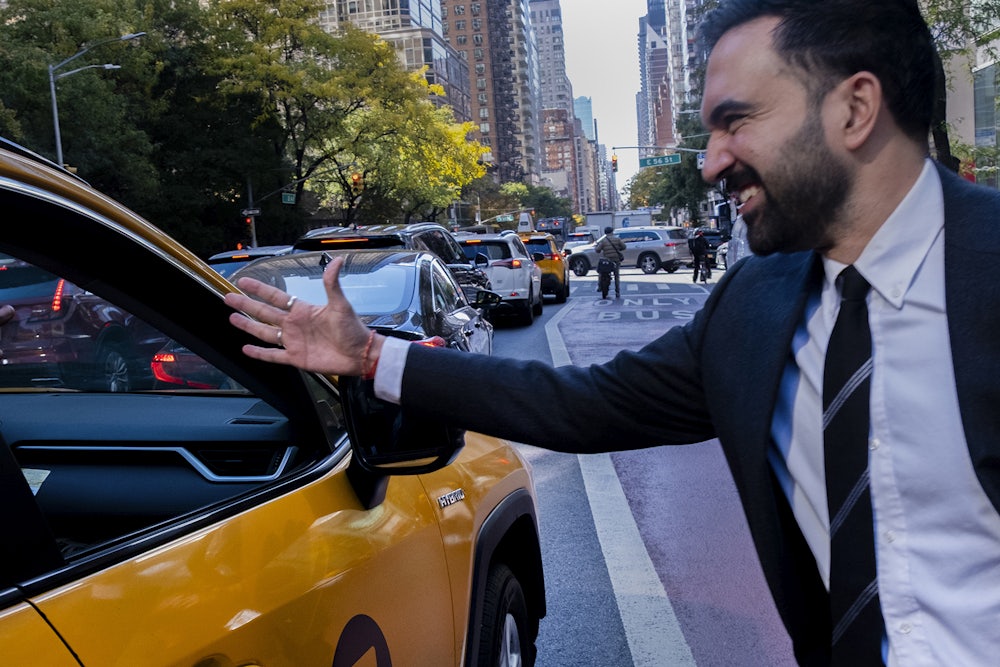If you want to understand why Zohran Mamdani, a 34-year-old backbench assemblyman almost no one had heard of a year ago, was just elected mayor of New York City, all you have to do is watch a three-minute video he posted on November 15, 2024.
Filmed days after Donald Trump’s victory, the clip—in which Mamdani roves the streets of Queens and the Bronx with a microphone—could easily be mistaken for a local news hit about why diverse, working-class neighborhoods in the city had shifted dramatically rightward.
“Market prices are going up,” one elderly man tells him. “I like the Democrats,” he continues. “But I don’t like this in Gaza.” That more or less summed it up. Again and again, Trump voters and nonvoters say that they care about ending the genocide in Gaza and are concerned about inflation. The Democrats run “glitzy campaigns” and “get celebrities,” one young man says, but they weren’t listening to the people. Trump was—or at least he seemed to be when he promised to stop the war and bring prices down. When Mamdani asks someone else what it would take for him to vote for a Democrat, the young man is blunt: The party would have to “pay attention to regular Americans and their economic needs.”
Only in the final 30 seconds of the video does it become clear that what you are watching is a stealth political ad that cleverly blends the conventions of local news with the sharp edits of TikTok. “If there was a candidate talking about freezing the rent, making buses free, making universal childcare a reality, are those things you’d support?” Mamdani asks one voter. They were—and others agreed. It turned out that the man asking the questions had the answers, too.
It’s all in that three-minute video: the overriding focus on the affordability crisis and the genocide in Gaza—the two issues that would define his campaign—as well as the conviction that Mamdani knows how to correct the mistakes that helped cost his party the presidency. Those issues, moreover, aren’t introduced by the candidate, but by real people who happened to be willing to talk to a fellow New Yorker who, as the months passed, often seemed to be on the streets of all five boroughs at once.

That is ultimately how a young Muslim democratic socialist born in Uganda defeated Andrew Cuomo, the state’s former governor, not once but twice—first in the Democratic primary in June and then again in the general election five months later. Over the course of a year, Mamdani built a winning coalition from a multiracial mix of young and working-class New Yorkers, and strong turnout from South Asian and Black voters.
Mamdani’s fellow Democrats should have started paying close attention to what he was building back when that video appeared. Instead, they have largely kept him at arm’s length—or worse. Both Hakeem Jeffries, the party’s leader in the House of Representatives, and Chuck Schumer, his equivalent in the Senate, reside in and represent New York City. Jeffries provided a tepid endorsement of Mamdani in late October; Schumer provided none at all.
Many Democrats may live in fear of associating with the proud left-winger who will soon take the reins of America’s largest city and are already fretting about his bearded face popping up in midterm attack ads. But Mamdani hasn’t just won an improbable and historic victory in the biggest city in the country; he has provided a template for other Democrats as they begin the difficult work of regaining political power. Mamdani won because he corrected mistakes the party made in 2024: He offered concrete policies, he didn’t shrink from bad-faith attacks, and he talked to pretty much anyone who would listen. Most importantly, he understood that voters are looking for new kinds of candidates and responding to new messaging. The game has changed, and Mamdani knows how to win it.
When Mamdani took to the streets last November, he was the longest of long shots. But, as he joked in The New York Times Magazine, “there was never going to be a poll that said, ‘The time is now for Zohran Mamdani and a campaign on affordability.’” Consultants and seasoned campaign staffers would have pointed him elsewhere, most likely to “public safety,” which was then consistently polling as one of the most important issues for New York City voters. By deciding to center his mayoral campaign on the cost-of-living crisis, Mamdani was trusting his gut—and the wisdom of what people around him were saying.
That affordability became the defining issue in the mayoral election shouldn’t have come as a surprise to anyone, however. It had just been the defining issue of the 2024 presidential election, after all. And Mamdani had the advantage of being an outsider and an insurgent: It’s understandable to blame a president or a vice president for the high cost of eggs, but it makes no sense to hang it on a backbench state assemblyman.
For Joe Biden and Kamala Harris, inflation was an albatross. Their administration did commendable work to rein it in, but voters didn’t want to hear that the economy was actually doing pretty well, especially in comparison to other developed countries. They cared that costs were still too high. Many of the White House’s proposed solutions were wonky and convoluted. Harris, for instance, pledged to lower housing costs by establishing “the first-ever tax incentive for homebuilders who build starter homes sold to first-time homebuyers.” It’s no surprise that both Biden and Harris often seemed to shy away from talk about inflation. They didn’t know what to say.
Zohran Mamdani did. For all the talk of his campaign’s innovative use of social media, the root of his success is deeply old-fashioned: He has extraordinary message discipline. In interviews and debates, Mamdani hammered the cost-of-living crisis, constantly redirecting conversation back to it. But he didn’t just repeat talking points ad nauseum: He found innovative ways to deliver them. Mamdani’s real breakout came in January, two months after he launched his campaign, when he posted a video titled NYC Is Suffering From Halalflation, in which he talked to food cart vendors about the rising costs of food and the red tape of parking permits, before explaining how legislation could make street meat less expensive—all while eating a $10 plate of chicken and rice.
That video has been viewed more than 20 million times, and it’s easy to see why. Most politicians don’t run clever, funny ads featuring heart-to-hearts with halal cart owners. Mamdani was different. And he was running a campaign built on concrete, legible proposals to lower costs, not heavily qualified tax credits. Mamdani not only offered solutions to vexing problems; he had a knack for finding creative ways to communicate them.
If Mamdani’s message discipline was old-fashioned, his approach to media was very twenty-first century. Here, too, he broke with Biden and Harris. Biden couldn’t do many interviews, thanks to his advanced age. And Harris just wouldn’t. The most famous interview of her 2024 campaign was one she didn’t do, and that refusal to sit down with weed-smoking, conspiracy-peddling, right-leaning podcaster Joe Rogan is often cited as a contributing factor to Harris’s loss—she needed to win young men but wouldn’t go where they were. Over the last year, Mamdani has spoken with left-wing Twitch streamer Hasan Piker, sports journalist Pablo Torre, a TikToker named Crackhead Barney—and countless other influencers and reporters. Mamdani did something that Trump and his running mate JD Vance expertly modeled in 2024, when they sat down with pretty much anyone—and delivered a message that more or less fit the audience they were addressing. This is the new media environment. The old one, where all you need are talking points tailored for Meet the Press, is dead.
Mamdani’s long-standing support for Palestine played a different but similarly instrumental role in his victory. For critics and opponents, it was the focal point of their attacks, all of which were intended to paint him as someone who was simply too radical—or, in some cases, too Muslim—to be mayor of New York City. Those attacks backfired for two reasons. The first: many establishment figures’ seeming incomprehension that, in the wake of the genocide in Gaza, Democratic voters no longer support Israel as they once did. The second: Those attacks only underlined that Mamdani was not a member of a Democratic establishment that many viewed with skepticism—or worse. Taking a stand for Palestinians, moreover, proved that Mamdani had convictions that he could be counted on to uphold in the face of blowback and criticism. “Whenever you are at peace with the making of an exception, you make it easier to make another exception—wherever, whenever,” Mamdani told the Times magazine.
That steadfast commitment to Palestinian rights resulted in furious criticism in the media and from his fellow Democrats, and an avalanche of attack ads funded by pro-Israel billionaires. If Mamdani qualified aspects of his support for Palestine—distancing himself from the controversial “Globalize the Intifada” chant, for instance—he didn’t really moderate his criticism of Israel’s apartheid state either. By holding firm amid that onslaught, moreover, Mamdani suggested that, if elected, he could be trusted to carry out his promises. Attacks aimed at painting him as an extremist, in other words, had the unintended effect of illustrating that he was a man of integrity. Here, too, Mamdani stands in sharp contrast to Biden and Harris, who would chastise Israel for its handling of the war in Gaza while sending it billions in arms.
The Democratic Party is addicted to messaging that is carefully—and expensively—calibrated to reach a hypothetical median voter. It has a strategist problem, in other words: Politicians won’t test messages or take positions until they’ve been extensively tested by these so-called experts. Strategists produce convoluted policies, candidates who are terrified to deviate from talking points, and campaigns that are proven failures—just look at 2016, 2024, and the current makeup of the House and Senate.
Mamdani’s rise not only proves you can ignore all of that stuff and still win; it shows that you need to ignore it. Today’s candidates have to be willing to go almost anywhere and adapt their message to reach the people who are there, whether they’re talking to them for 30 seconds or three hours. Message discipline is as important as ever—you just can’t sound like you’re on Meet the Press. Conviction and authenticity matter more today than they have at any other point in American history, and voters are clearly more receptive to tangible policies they can easily grasp—like free buses—than they are to abstractions like tax credits for which they probably aren’t even eligible.
Nearly all of these lessons were apparent when Donald Trump won in 2016. But Democrats didn’t learn them then. Zohran Mamdani is offering another opportunity to correct many of the missteps that have doomed the party in recent years. Many in the party are nevertheless dismissing him in similar terms to those used to describe Trump. They say that he’s a radical, a fluke, an exception. But whether the party leaders like it or not, Mamdani is offering a glimpse of the future.




